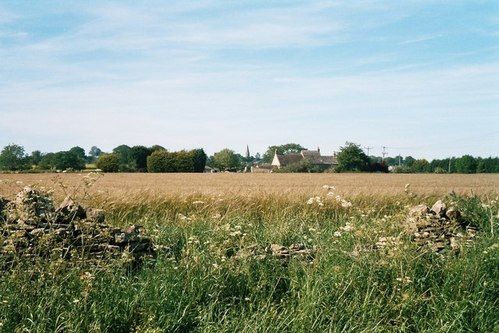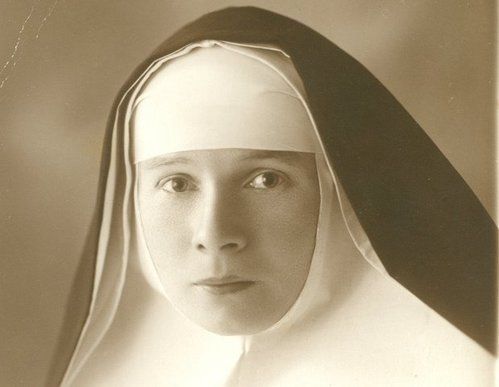Flourishing in the Silence: Our Solitude Sanctuaries
Flourishing in the Silence: Our Solitude Sanctuaries

It was twenty years ago this spring that I set off for England. I had the glorious gift of spending almost a year away in study. I lived sixteen miles northwest of Oxford, in the Cotswolds, in a small hamlet called Field Assarts. Tucked along a bend in the road, my rural crossroads had a beautiful parish church and a clutch of lovely, honey-colored stone houses, surrounded by verdant green fields, copses of trees, ancient ruins with a dovecote, and hedgerows.
I lived in a tiny cottage with a walled-in garden. Beyond the swing of my gate were jaunts, over stiles and along rivers, and wandering to my heart’s content. My few but kind neighbors called me their “American Rambler.” My intentional experiment that year was to live in the silence by myself. No television, no computer, no phone, no radio. Just the silence. Alone. I wondered what I might learn about God and myself from living in the stillness for an extended period of time. The year changed my life. I realized that I needed the fellowship of others.
But I am not the only one to have experienced this. Our Christian family history includes thousands who have lived in isolation, both voluntarily, and involuntarily, across the centuries. What they learned about God during times of isolation transformed them. Their lives then made a positive difference upon others. Shall we meet some of them?
I lived in a tiny cottage with a walled-in garden. Beyond the swing of my gate were jaunts, over stiles and along rivers, and wandering to my heart’s content. My few but kind neighbors called me their “American Rambler.” My intentional experiment that year was to live in the silence by myself. No television, no computer, no phone, no radio. Just the silence. Alone. I wondered what I might learn about God and myself from living in the stillness for an extended period of time. The year changed my life. I realized that I needed the fellowship of others.
But I am not the only one to have experienced this. Our Christian family history includes thousands who have lived in isolation, both voluntarily, and involuntarily, across the centuries. What they learned about God during times of isolation transformed them. Their lives then made a positive difference upon others. Shall we meet some of them?
Pachomius (290-346) was born in Egypt in a pagan home, but was converted as a young man and grew in faith. Wanting to become a hermit, like his mentors, he lived in solitude in the desert for a time. Then God called him to live in community with other believing brothers and sisters. Out of his solitude, Pastor Pachomius wrote a guidebook for communal living, which soon became the foundation for Christian monasticism. He had learned the value of a precious gift of God: the sweetness of living for Christ in communion with other believers. In his lifetime, Pachomius founded at least eight communities with almost a thousand monks and nuns.

Patrick (5th c) says he was not much of a Christian before he was captured as a teenager and sold into slavery in Ireland. After much cruel treatment, his new master set him to tending sheep. In those long years of solitude in the hills, Patrick’s suffering turned him God-ward. He learned to pray for hours each day, and to meditate on God’s goodness. He miraculously escaped from slavery, and then trained for ministry and ordination. He was then called to return to Ireland, where he became an effective missionary. Early Christianity in Ireland owes its faith to a young man who was forced into isolation and emerged as a man who loved God relentlessly.
Alice of Schaerbeek (1220-1250) was known for her intelligence and devotion to Christ even as a girl. But when Alice was in her teens, she contracted leprosy, a disease that was thought to be so contagious that she was taken to a convent to live in isolation. For the rest of her life, Alice found that, to the degree that her body weakened, her inner person strengthened. She grew in wisdom. Her prayer life sustained her. Others would come and stand outside her door and seek counsel about spiritual things. Alice became a stalwart woman of faith from her classroom of suffering.

Julia Rodzinska (1899-1945) was a Dominican Polish nun and teacher who directed an orphanage and was much loved by the children. When the Nazis invaded Poland, they closed the orphanage. Julia was arrested and sentenced to solitary confinement. She lived for a year in a tiny, cramped cement closet, which was not large enough for her to stretch her legs fully. She decided to turn this space into her sanctuary instead, learning to pray effectively, to praise purely, to memorize the Psalms. Her time in solitude strengthened and transformed her. When Julia was eventually transferred to a concentration camp, she became a leader of prayer circles, nursed abandoned Jewish prisoners during a typhus outbreak, and served as a beacon of light in the darkness of Stutthof. The other prisoners called her “The Angel of God.”
Observations from Isolation
As “Stay at Home” instructions have reordered our lives in the past months, some have felt overwhelmed at the constant presence of other people in their former spaces, like roommates, family members, and children, who seem always now within sight or sound. Others have been home alone, missing real-life interactions, gatherings with family and friends, or the ability to move about with freedom. Most of us have sensed a fresh longing to be together as “the church.” We wonder how we can continue in the isolation, or what permanent changes “social distancing” will bring to our former patterns of life.
For those who are feeling unsettled, it can help to know that others have walked similar paths to ours, and have flourished, both in lives they chose, and in lives they would not have chosen for themselves. It is good to remind ourselves that God is also in the solitude. And perhaps, when we go there and seek Him intentionally, He meets us in ways we have never known before. From our silence, God can make our fellowship with Him and others even more sweet and deep and rich.
For those who are feeling unsettled, it can help to know that others have walked similar paths to ours, and have flourished, both in lives they chose, and in lives they would not have chosen for themselves. It is good to remind ourselves that God is also in the solitude. And perhaps, when we go there and seek Him intentionally, He meets us in ways we have never known before. From our silence, God can make our fellowship with Him and others even more sweet and deep and rich.
“You will seek me and find me when you seek me with all your heart.”
Jeremiah 29:13
Jeremiah 29:13
-Karen O'Dell Bullock
Posted in PeaceWeavers